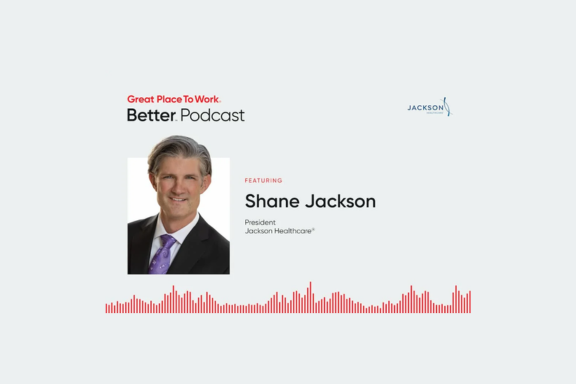
Shane Jackson on GPTW’s Podcast to Discuss Purpose, Clarity and Meaningful Work
Shane Jackson, president of Jackson Healthcare, sits down with host Roula Amire in this episode of Better by Great Place To Work to discuss […]
The following article was written by Shane Jackson and first appeared in The Washington Times on Wednesday, December 22, 2021. It is reprinted with permission.
It has been common knowledge in healthcare over the past two decades that there is a nursing shortage. Healthcare providers have developed the ability to manage around the shortage. Among these solutions is the growth of travel nursing, where nurses move around the country to work temporarily where they are needed most during times of increased patients loads.
However, over the past two years as the country has dealt with Covid, we have learned just how exposed the healthcare industry is to nurse labor constraints. Ask almost any hospital CEO, and he or she will tell you that labor shortage is the biggest problem they are currently facing.
The stress of the pandemic has taken a toll on all of us, but healthcare professionals have inarguably taken the brunt of it. Over the past few months, many nurses, therapists and even doctors have retired early or changed professions after experiencing the incredible psychological toll caused by the challenges of caring for patients during this trying time. And as those individuals left the market, they left behind fewer people to care for increasingly sick patients.
It was in this environment that vaccine mandates were imposed by the federal government.
Most surveys show that well over 90% of healthcare providers have been vaccinated. Many hospitals that have instituted their own mandates even prior to the federal one reported much more adherence than expected – meaning fewer people than feared refused to get a vaccine and left their job.
The problem is that in an environment where hospitals are already having to close beds due to a lack of staff, we can’t afford to lose anyone from the labor pool.
Last week, several major healthcare systems – like HCA Healthcare and Tenet Healthcare, as well as nonprofits, including AdventHealth and Cleveland Clinic – announced that they have removed the vaccine requirement. As stated in the Wall Street Journal editorial Some Hospitals Drop Covid-19 Vaccine Mandates to Ease Labor Shortages, “Vaccine mandates have been a factor constraining the supply of healthcare workers.”
Data from a recently completed survey of travel nurses and therapists conducted by our company gives more color as to why these systems made this decision. Some 36% of travel nurses surveyed reported that they are not vaccinated and do not plan to get the Covid vaccine. This number is well above the national averages for nurses overall. Many of these nurses have left hospitals that mandated vaccines and started working as a travel nurse, so they could go to a location without a mandate in order to keep working.
When we asked what they would do if mandates were universal, 25% said they would leave the nursing profession altogether. That is a significant number of nurses.
Regardless of one’s view of vaccines, we must recognize the reality that there are many healthcare workers who are reluctant or even opposed to getting vaccinated. And this winter, when we face the next surge of Covid patients, these are the care providers that will enable many hospitals to stay open.
Federal policies are blunt instruments that leave no room for adjusting to local conditions. It is not inconsistent to believe that people should get vaccinated yet allow those on the ground to make decisions about what is needed in that area.
Overly broad vaccine mandates may be a well-intentioned way to protect people but do more harm than good if they drive nurses and other care givers out of the workforce.
Even prior to Covid vaccine availability, hospitals have proven that they are able to operate safely while taking care of significant numbers of very sick patients. We must trust them to do so now. The federal government needs to withdraw the mandates and give healthcare leaders the freedom to do what they do best – take care of patients.